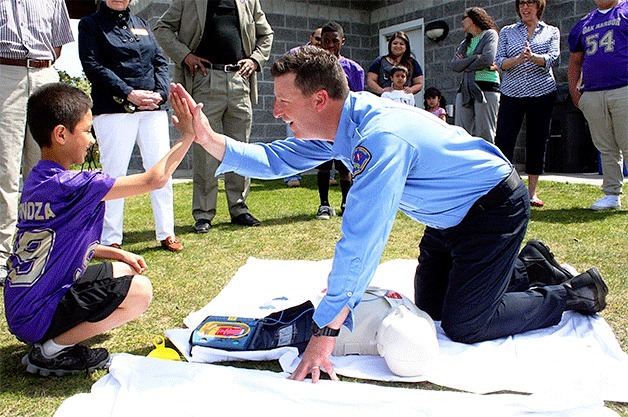The first few minutes when a person is unresponsive are the most critical, according to Whidbey General Hospital paramedic Rob May.
For that reason an automated external defibrillator, or AED, was recently installed at the snack shack at Fort Nugent Park.
The park is heavily used by Oak Harbor Football and Cheer League, as well as other organizations, and organizers want to ensure both youth and adults have the best chance for survival in case of an emergency.
“We want to make it as safe as possible,” May said.
May demonstrated how to use the AED earlier this month to coaches and players with the league. May said the park is a far-removed site with a five to six minute response time from a staffed firehouse.
The new AEDs are becoming a norm in the emergency response world, May said, because they are easy to use and increase survival rates.
“The new CPR is very, very easy to learn,” May said. “Now we’re coupling that with the updated AEDs, which are as simple as turning it on and following the directions.”
Once the sensors of the AED are put on the person’s body as directed, the machine will indicate if the person needs a shock.
“The machine won’t let you shock someone who doesn’t need it,” May said.
As long as the person remains unresponsive, CPR should be maintained the entire time except when a shock is required.
Brian Jones, with Oak Harbor Football and Cheer League, said the organization has been working for a long time with Whidbey General EMS to get every coach and parent trained in CPR and AED use. During practice there can be more than 200 people on the field at one time.
“Within our organization you cannot be on that field unless you’ve been trained,” Jones said. “CPR has changed in the last 25 years. We think this provides a level of safety. It’s a great community asset.”
May said organizations or individuals who wish to purchase their own defibrillators can apply for state grants to help pay for the machine that costs around $1,500.
“There’s no shortage of resources for a community need like this,” May said.
The Fort Nugent Park AED was donated in part by EMS staff and grants secured through the Whidbey General Hospital Foundation.
“Community wellness is one of our primary focuses,” said Helen Taylor, foundation director. “Providing this equipment allows EMS staff to train people from one end of the island to the other to use these and save lives.”
“We’re thrilled to be working with EMS. They’re one of our greatest assets.”



